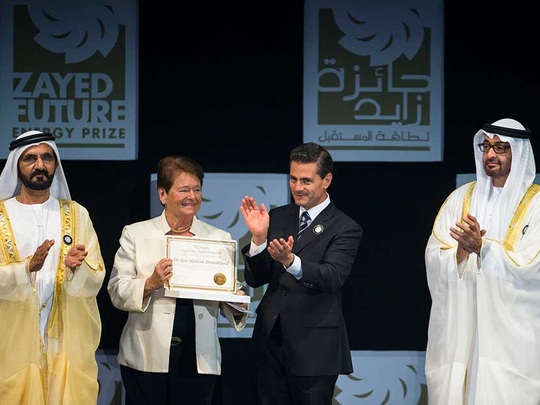
Every year, on the occasion of the United Nations Environment Day, I take a moment to reflect on how far we have come and what we have left to do to deliver on the promise of a sustainable future for all.
Looking back at the last 12 months, there is a lot to be optimistic about. On April 25, 175 countries convened in New York City to sign the Paris Climate Agreement, representing a key milestone in global action on climate change and sustainability.
This momentum began with the ratification of the Sustainable Development Goals during the UN General Assembly in September and continued through to the historic agreement reached in December at Conference of Parties (COP) 21 in Paris. Now the task in front of us is to turn the global consensus into action that has real impact. To understand how we are to really move forward, we need to remember where we came from.
In 1983, Javier Perez de Cuellar, the then UN secretary-general, had invited me to establish and chair the World Commission on Environment and Development.
In the early 1980s, we had reached a point in global development where we were seeing significant environmental degradation in a number of areas without anyone connecting the dots as to why and how this was happening. Nobody was really thinking about — or perhaps willing to think about — how our template for development might have to change, going forward.
We analysed the alarming trends and to help catalyse the necessary shift in thinking, we introduced the concept of “sustainable development”. We defined the term as development that meets the needs of the present without compromising the ability of future generations to meet their own needs.
This concept of economic growth that does not come at the expense of the environment is one that first started to show how all the dots are connected. In our report, we clearly made the case that how we treat the world today will shape the world of tomorrow — and if we don’t change, our impact will be both negative and irreversible.
Another important contribution we made to the global discussion was illustrating clearly that the task of preserving the planet for future generations was a collective challenge.
We titled our report ‘Our Common Future’. We argued that governments must recognise their interdependence and must come together to search for a common and sustainable development path.
Leadership
I admire the leadership of the UAE for being among the first to recognise the need for shared responsibility and collective action. Guided by the teachings of the UAE’s founding father, late Shaikh Zayed Bin Sultan Al Nahyan, the UAE leadership embraced sustainable development as a guiding precept in its growth agenda.
In the decades since we released the report, it has become increasingly clear that governments alone cannot solve the global challenges. More must be done by the private sector and businesses to deliver shared value that simultaneously benefits people and the planet.
Civil society and people all over the world also play a fundamental role in preserving the health of our environment and in finding innovative solutions that truly meet the needs of our communities. To really succeed in delivering a sustainable future for all, I believe we must unlock the potential of every sector of society — of every person in the world — to solve the challenges that lie ahead.
This January, I came to Abu Dhabi to receive the Lifetime Achievement Award of the Zayed Future Energy Prize. I was immensely proud to have received this honour, not only because of the recognition for my own work, but also because of what the prize stands for.
The prize embodies my own belief in what is needed to advance the cause of sustainable development — namely, that we must inspire and empower every sector of society.
Through its five categories of winners — from lifetime achievement to large corporations to small-and-medium enterprises to non-profit organisations to global high schools — the prize makes the bold claim that everyone has a role to play in bringing about sustainable solutions.
Through this unique approach, the prize is helping deliver on the promise of Sustainable Development Goals, to advance the target of delivering sustainable energy for all and to empower innovators in energy to provide deployable solutions for our critical energy needs.
The prize’s impact also comes from its global community of winners.
These winners, including me, are delivering energy access to remote parts of Africa, providing clean energy transport solutions to major cities, bringing potable water to last-mile communities in Indonesia and offering a platform to young people to embrace sustainable living.
The UAE, through initiatives such as the Zayed Future Energy Prize, can be proud of the part it is playing in advancing the cause of sustainable development.
For my own part, as I think about the tremendous progress made over the last year and as I think about the growing community across the globe that is working tirelessly to create and deliver solutions, I cannot help but be optimistic about our collective future.
Dr Gro Harlem Brundtland, former prime minister of Norway, is deputy chair of The Elders and vice-chair of the United Nations Foundation Board. In January of this year, she received the Lifetime Achievement Award of the Zayed Future Energy Prize.








